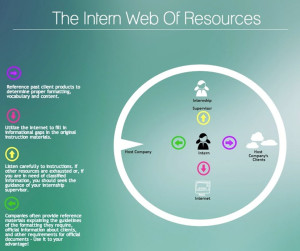In my last post, I talked about two different scenarios you might face as an intern. Obviously, these two situations do not account for the entire range of problems that interns face. To provide a more broad range of suggestions, I have come up with a list of rules to remember to both cope with and help prevent intern adversity.
1) Take advantage of resources: Listen diligently the first time you are given instructions for an assignment, read all the material that is available to you, and always do your own research before asking questions. This map can help you recognize which resources are available you as an intern, and when is appropriate to utilize each one (click image to enlarge):
2) Know when you need to ask a question and when you do not: Sometimes, information is so sensitive or new that it must be requested from your supervisor; other times, information can be found in numerous places, and it can be disrespectful to demand it from your supervisor –know the difference!
3) Embrace Trial & Error: Don’t be afraid to explore work techniques, programs, and research strategies on your own.
4) Know your strengths and weaknesses: In order to choose the most effective work strategy and implement it as quickly as possible, you should come to work with an idea of what ways you function best while successfully managing time. (for example, I know that I have a hard time remembering numbers, so whenever I need to copy a number into a document I write it down on paper first. While this method works best for me, another intern might find this slows them down. It is all a matter of preference and personal retention style).
5) Reference existing documents: if this option is not available to you, it would most likely be explicitly stated at the beginning or those files would be restricted. If they are available, take advantage of them! The best way to produce quality work is to understand the expectations. The best way to understand the expectations of a project is to study a product that fulfills those expectations!
6) Always triple check work: make sure to use only credible sources and that you accurately copy and cite the information from where you found it. Always try to maintain accuracy and proper form while producing intern work. Deadlines are prone to shifting and, should the deadline be pushed forward, you do not want to be caught with incorrect or disordered work. Also always check your work once more before turning in. Silly mistakes communicate to your supervisor that you are careless. You never want to cheat yourself because of something you actually know how to fix.
7) Manners matter: This one may seem obvious, but it is important nonetheless. No intern is perfect; politeness may not make up for all mistakes, but it can make you more likable. Being likeable never hurt anyone’s career.
8) Take responsibility: You are human, and though you now know some strategies to help avoid mistakes on-the-job, you will inevitably make one or two in your time as an intern. When you do make a mistake, claim it and own the consequences. In part, this means showing an honest remorse for your actions, but, more than anything, it means stepping up when it is your responsibility to make amends.
The internship phase of any career is one designated for learning and gaining experience. Because of this, it is no surprise that interns often encounter numerous roadblocks while adapting to the heightened expectations of the professional world. In order to take full advantage of internship opportunities, it is important that interns both embrace these inevitable adversities as well as take a proactive approach to solving any problems that may arise. The key is not to be a perfect intern, but rather, a prepared intern.



 Follow
Follow